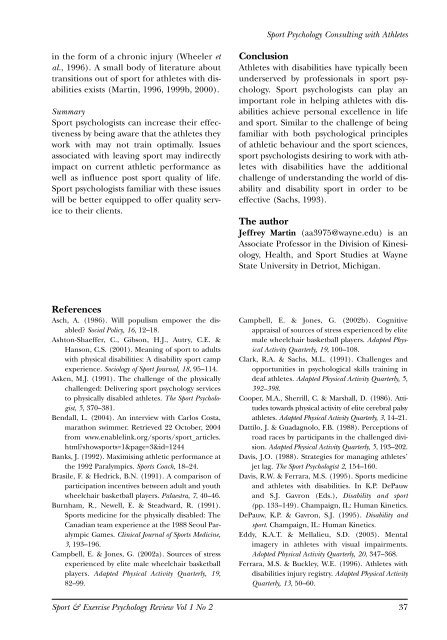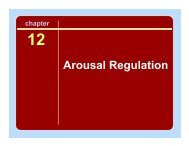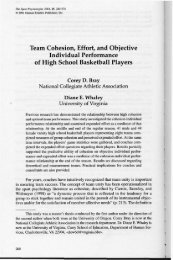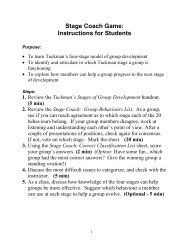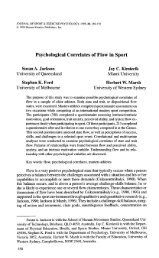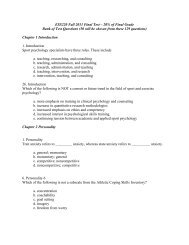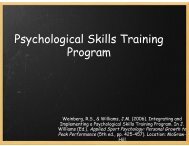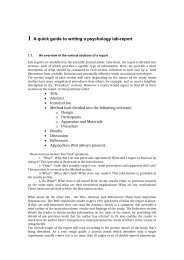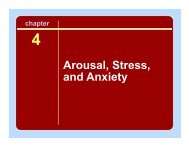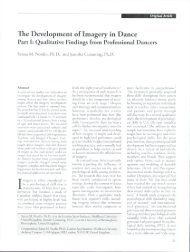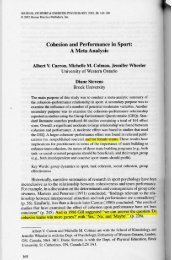Sport and Exercise Psychology Review - Sport Psychology Goes to ...
Sport and Exercise Psychology Review - Sport Psychology Goes to ...
Sport and Exercise Psychology Review - Sport Psychology Goes to ...
Create successful ePaper yourself
Turn your PDF publications into a flip-book with our unique Google optimized e-Paper software.
<strong>Sport</strong> <strong>Psychology</strong> Consulting with Athletes<br />
in the form of a chronic injury (Wheeler et<br />
al., 1996). A small body of literature about<br />
transitions out of sport for athletes with disabilities<br />
exists (Martin, 1996, 1999b, 2000).<br />
Summary<br />
<strong>Sport</strong> psychologists can increase their effectiveness<br />
by being aware that the athletes they<br />
work with may not train optimally. Issues<br />
associated with leaving sport may indirectly<br />
impact on current athletic performance as<br />
well as influence post sport quality of life.<br />
<strong>Sport</strong> psychologists familiar with these issues<br />
will be better equipped <strong>to</strong> offer quality service<br />
<strong>to</strong> their clients.<br />
Conclusion<br />
Athletes with disabilities have typically been<br />
underserved by professionals in sport psychology.<br />
<strong>Sport</strong> psychologists can play an<br />
important role in helping athletes with disabilities<br />
achieve personal excellence in life<br />
<strong>and</strong> sport. Similar <strong>to</strong> the challenge of being<br />
familiar with both psychological principles<br />
of athletic behaviour <strong>and</strong> the sport sciences,<br />
sport psychologists desiring <strong>to</strong> work with athletes<br />
with disabilities have the additional<br />
challenge of underst<strong>and</strong>ing the world of disability<br />
<strong>and</strong> disability sport in order <strong>to</strong> be<br />
effective (Sachs, 1993).<br />
The author<br />
Jeffrey Martin (aa3975@wayne.edu) is an<br />
Associate Professor in the Division of Kinesiology,<br />
Health, <strong>and</strong> <strong>Sport</strong> Studies at Wayne<br />
State University in Detriot, Michigan.<br />
References<br />
Asch, A. (1986). Will populism empower the disabled?<br />
Social Policy, 16, 12–18.<br />
Ash<strong>to</strong>n-Shaeffer, C., Gibson, H.J., Autry, C.E. &<br />
Hanson, C.S. (2001). Meaning of sport <strong>to</strong> adults<br />
with physical disabilities: A disability sport camp<br />
experience. Sociology of <strong>Sport</strong> Journal, 18, 95–114.<br />
Asken, M.J. (1991). The challenge of the physically<br />
challenged: Delivering sport psychology services<br />
<strong>to</strong> physically disabled athletes. The <strong>Sport</strong> Psychologist,<br />
5, 370–381.<br />
Bendall, L. (2004). An interview with Carlos Costa,<br />
marathon swimmer. Retrieved 22 Oc<strong>to</strong>ber, 2004<br />
from www.enablelink.org/sports/sport_articles.<br />
html?showsports=1&page=3&id=1244<br />
Banks, J. (1992). Maximising athletic performance at<br />
the 1992 Paralympics. <strong>Sport</strong>s Coach, 18–24.<br />
Brasile, F. & Hedrick, B.N. (1991). A comparison of<br />
participation incentives between adult <strong>and</strong> youth<br />
wheelchair basketball players. Palaestra, 7, 40–46.<br />
Burnham, R., Newell, E. & Steadward, R. (1991).<br />
<strong>Sport</strong>s medicine for the physically disabled: The<br />
Canadian team experience at the 1988 Seoul Paralympic<br />
Games. Clinical Journal of <strong>Sport</strong>s Medicine,<br />
3, 193–196.<br />
Campbell, E. & Jones, G. (2002a). Sources of stress<br />
experienced by elite male wheelchair basketball<br />
players. Adapted Physical Activity Quarterly, 19,<br />
82–99.<br />
Campbell, E. & Jones, G. (2002b). Cognitive<br />
appraisal of sources of stress experienced by elite<br />
male wheelchair basketball players. Adapted Physical<br />
Activity Quarterly, 19, 100–108.<br />
Clark, R.A. & Sachs, M.L. (1991). Challenges <strong>and</strong><br />
opportunities in psychological skills training in<br />
deaf athletes. Adapted Physical Activity Quarterly, 5,<br />
392–398.<br />
Cooper, M.A., Sherrill, C. & Marshall, D. (1986). Attitudes<br />
<strong>to</strong>wards physical activity of elite cerebral palsy<br />
athletes. Adapted Physical Activity Quarterly, 3, 14–21.<br />
Dattilo, J. & Guadagnolo, F.B. (1988). Perceptions of<br />
road races by participants in the challenged division.<br />
Adapted Physical Activity Quarterly, 5, 193–202.<br />
Davis, J.O. (1988). Strategies for managing athletes’<br />
jet lag. The <strong>Sport</strong> Psychologist 2, 154–160.<br />
Davis, R.W. & Ferrara, M.S. (1995). <strong>Sport</strong>s medicine<br />
<strong>and</strong> athletes with disabilities. In K.P. DePauw<br />
<strong>and</strong> S.J. Gavron (Eds.), Disability <strong>and</strong> sport<br />
(pp. 133–149). Champaign, IL: Human Kinetics.<br />
DePauw, K.P. & Gavron, S.J. (1995). Disability <strong>and</strong><br />
sport. Champaign, IL: Human Kinetics.<br />
Eddy, K.A.T. & Mellalieu, S.D. (2003). Mental<br />
imagery in athletes with visual impairments.<br />
Adopted Physical Activity Quarterly, 20, 347–368.<br />
Ferrara, M.S. & Buckley, W.E. (1996). Athletes with<br />
disabilities injury registry. Adapted Physical Activity<br />
Quarterly, 13, 50–60.<br />
<strong>Sport</strong> & <strong>Exercise</strong> <strong>Psychology</strong> <strong>Review</strong> Vol 1 No 2 37


